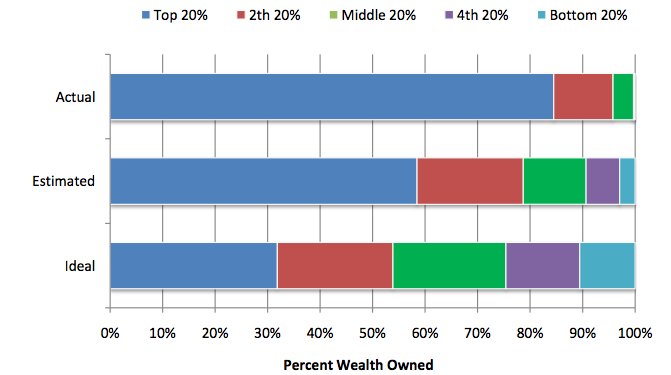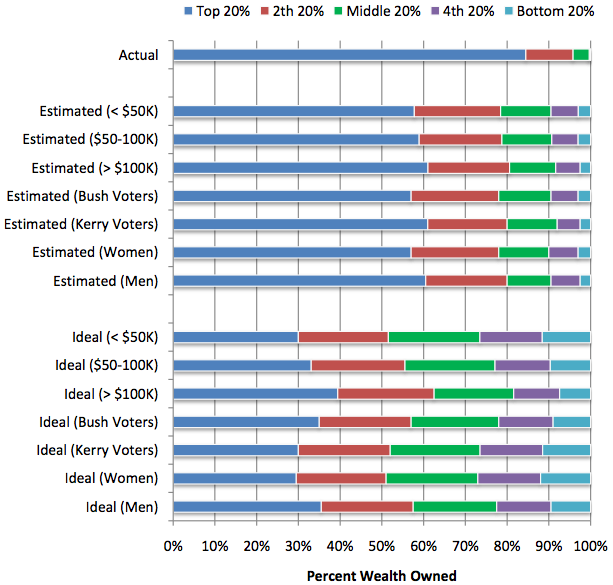It drives me batty to hear so-called conservatives and libertarians prattling on about liberty and freedom without seeming to realize or even consider what seems fairly obvious to me: for the vast majority of people, liberty — the freedom to do what you want to do from day to day, year-in and year-out, and in the course of your lifetime — is largely a function of one thing: your bank balance.
Not some ebil gubmint man.
If you’ve got a million dollars in the bank, you’ve got a lot more freedom and liberty than if you have squat.
If that proposition has merit, you can actually go out and measure who has freedom and liberty in this country. The following has been making the rounds of the econoblogosphere, and speaks to that question directly.
Figure 2. The actual United States wealth distribution plotted against the estimated and ideal distributions across all respondents. Ariely and Norton, 2010 (PDF).
Lessons:
1. As I and many others have pointed out, wealth inequality utterly dwarfs income and consumption inequality. If you’re not in the top 40% — really the top 20% — you don’t own shit.
2. People aren’t even aware of #1. We all know how bad humans are at drawing accurate conclusions from casual day-to-day observations; this is just more proof. (As I’ve pointed out, 45% of Americans think they’re at least somewhat likely to be wealthy some day, when in fact only a few percent are.)
3. Americans want to live in Sweden. Their “ideal” distribution looks downright Marxist.
My unsolicited (and largely unsupported) opinion: I think that ideal distribution looks insanely utopian — both impossible and undesirable. There’s just not enough carrot there to to incentivize the strivers who make all boats rise. (Yeah I know: I hate the word “incentivize.”) If the wealth distribution looked like this ideal, I think we’d all be much poorer.
Libertarians and conservatives will have already drawn the obvious conclusion: these skewed estimates and wacky ideals result from a bunch of granola-crunching left-wing utopians. (Admit it: you’d already thought of that, hadn’t you?)
Not so much. Here’s Figure 3:
The estimates and ideals are remarkably consistent (with some small and fairly predictable skews by segment). And the estimates are consistently — and wildly — wrong. Everybody thinks the top 20% holds 55-60% of the wealth (it’s actually about 85%), and everybody thinks the bottom 20% should have about 10% of the wealth (it’s actually, effectively, zero).
Now one thing is certainly true: Big corporations’ freedom is seriously constrained by government — as it must be for the sake of everyone’s freedom and prosperity, including the corporations’.
Corporate capitalism is arguably the most powerful and efficient wealth generator (for all) in the history of the world. But a corporate-capitalist system left to its own devices inevitably pumps the wealth to the top. It’s an “emergent property” of the system. And as we’ve seen, greater wealth inequality (at least in prosperous countries, postwar) results in much slower growth over the long term (which is what matters), hence less prosperity for all.
So it’s not hard to understand why corporations want you to believe that big gubmint’s da problem: government is the only entity powerful enough to go up against the corporations, and give people anything like the widespread prosperity — and freedom — that they believe exists, and want to exist.


Comments
3 responses to “Liberty, Freedom, and Wealth: Americans Say Power to the People!”
The net effect of government regulation is frequently to entrench the companies already on top. The cost of regulatory compliance can get to a point where only the large companies can even afford it, precluding competition.
Chris, absolutely true.
But the solution is not (necessarily) less regulation. The solution is (necessarily) better regulation.
Slowly but surely, over the decades and centuries, it has been getting better.
“I think that ideal distribution looks insanely utopian — both impossible and undesirable. There’s just not enough carrot there to to incentivize the strivers who make all boats rise”
The idea that income provides incentive has been proven to be untrue over many studies, including even Chicago economists. You can learn about it here:
http://www.youtube.com/watch?v=u6XAPnuFjJc
It’s just propaganda created to justify our failing system.